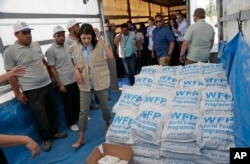A World Food Program review of the global hunger situation in 2016 finds conflict emergencies in the Middle East, Africa and elsewhere are hampering United Nations efforts to achieve zero hunger by the year 2030.
In its review 2016: A Year in Fighting Hunger, the World Food Program reports that 795 million people in the world went hungry last year. The organization's spokeswoman Bettina Luescher tells VOA the Sustainable Development Goal to eliminate hunger by 2030 does not, for now, appear realistic.
“As you know, the world is a mess," she said. "We have more emergencies than ever. We have more refugees than ever and we are struggling on all fronts to help the people be able to feed themselves.”
Last year, WFP assisted more than 82 million people with food or cash. While that is a lot, Luescher agrees it is far from enough. She says escalating conflicts are making the work of aid agencies much harder.
She says countries that had been making progress in development have gone backwards because of conflict. She points to South Sudan as an example of a country, which on the eve of independence appeared poised to prosper after decades of civil war.
“And look what happened," she said. "They went back to fighting and for the first time in six years, this year, we saw in some areas of South Sudan, a famine again. And, that is just unbelievable in this time in our new century. It is just unbelievable. So, the conflicts have to stop.”
Luescher says it takes money to fight hunger. Unfortunately, she says international support is waning at a time of burgeoning emergencies. She says WFP urgently needs one $1 billion to fight four looming famines in Yemen, Somalia, South Sudan and in northeast Nigeria.
She says it will be extremely difficult to save people dying from hunger without help from international donors.






